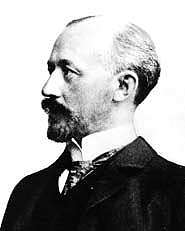Mikhail Dolivo-Dobrovolsky

Mikhail Osipovich Dolivo-Dobrovolsky (Russian: Михаи́л О́сипович Доли́во-Доброво́льский; German: Michail von Dolivo-Dobrowolsky or Michail Ossipowitsch Doliwo-Dobrowolski; Polish: Michał Doliwo-Dobrowolski; 2 January [O.S. 21 December 1861] 1862 – 15 November [O.S. 3 November] 1919) was a Polish-Russian engineer, electrician, and inventor.
He was born in Gatchina near Saint Petersburg, into a family of mixed origins, through the connection between a Polish noble family originating from Mazowsze and a Russian noble family. He emigrated to Germany because of the political persecution of Poles after the assassination of Alexander II of Russia (1881). He studied at the Darmstadt University of Technology (TH Darmstadt) in Germany. From 1887 he worked for AEG.

One of the founders (the others were Nikola Tesla, Galileo Ferraris and Jonas Wenström) of polyphase electrical systems, he developed the three-phase electrical generator and a three-phase electrical motor (1888) and studied star and delta connections. The triumph of the three-phase system was displayed in Europe at the International Electro-Technical Exhibition of 1891, where Dolivo-Dobrovolsky used this system to transmit electric power at the distance of 176 km with 75% efficiency. In 1891 he also created a three-phase transformer and short-circuited (squirrel-cage) induction motor.[1][2]
He designed the world's first three-phase hydroelectric power plant in 1891. During his life he obtained over 60 patents.
In 1911 he received an honorary doctorate from the TH Darmstadt. He died in Heidelberg, Germany, aged 57.
References
- ↑ Woodbank Communications Ltd.'s Electropaedia: "History of Batteries (and other things)"
- ↑ Gerhard Neidhöfer: Michael von Dolivo-Dobrowolsky und der Drehstrom. Geschichte der Elektrotechnik VDE-Buchreihe, Volume 9, VDE VERLAG, Berlin Offenbach, ISBN 978-3-8007-3115-2.